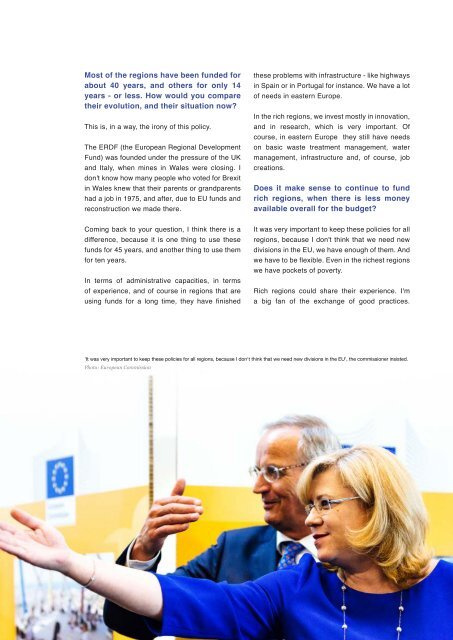Regions & Cities 2018: A deep dive into the EU regional funds
The European Union has allocated around €350bn for the 2014-2020 period to cohesion policy – accounting for a full third of the EU budget. Only the EU's agriculture policy receives more.
The European Union has allocated around €350bn for the 2014-2020 period to cohesion policy – accounting for a full third of the EU budget. Only the EU's agriculture policy receives more.
Create successful ePaper yourself
Turn your PDF publications into a flip-book with our unique Google optimized e-Paper software.
Most of <strong>the</strong> regions have been funded for<br />
about 40 years, and o<strong>the</strong>rs for only 14<br />
years - or less. How would you compare<br />
<strong>the</strong>ir evolution, and <strong>the</strong>ir situation now?<br />
This is, in a way, <strong>the</strong> irony of this policy.<br />
The ERDF (<strong>the</strong> European Regional Development<br />
Fund) was founded under <strong>the</strong> pressure of <strong>the</strong> UK<br />
and Italy, when mines in Wales were closing. I<br />
don't know how many people who voted for Brexit<br />
in Wales knew that <strong>the</strong>ir parents or grandparents<br />
had a job in 1975, and after, due to <strong>EU</strong> <strong>funds</strong> and<br />
reconstruction we made <strong>the</strong>re.<br />
<strong>the</strong>se problems with infrastructure - like highways<br />
in Spain or in Portugal for instance. We have a lot<br />
of needs in eastern Europe.<br />
In <strong>the</strong> rich regions, we invest mostly in innovation,<br />
and in research, which is very important. Of<br />
course, in eastern Europe <strong>the</strong>y still have needs<br />
on basic waste treatment management, water<br />
management, infrastructure and, of course, job<br />
creations.<br />
Does it make sense to continue to fund<br />
rich regions, when <strong>the</strong>re is less money<br />
available overall for <strong>the</strong> budget?<br />
Photo: hj_west<br />
Coming back to your question, I think <strong>the</strong>re is a<br />
difference, because it is one thing to use <strong>the</strong>se<br />
<strong>funds</strong> for 45 years, and ano<strong>the</strong>r thing to use <strong>the</strong>m<br />
for ten years.<br />
In terms of administrative capacities, in terms<br />
of experience, and of course in regions that are<br />
using <strong>funds</strong> for a long time, <strong>the</strong>y have finished<br />
It was very important to keep <strong>the</strong>se policies for all<br />
regions, because I don't think that we need new<br />
divisions in <strong>the</strong> <strong>EU</strong>, we have enough of <strong>the</strong>m. And<br />
we have to be flexible. Even in <strong>the</strong> richest regions<br />
we have pockets of poverty.<br />
Rich regions could share <strong>the</strong>ir experience. I'm<br />
a big fan of <strong>the</strong> exchange of good practices.<br />
'It was very important to keep <strong>the</strong>se policies for all regions, because I don't think that we need new divisions in <strong>the</strong> <strong>EU</strong>', <strong>the</strong> commissioner insisted.<br />
Photo: European Commission<br />
13 — REGIONS & CITIES <strong>2018</strong>

















